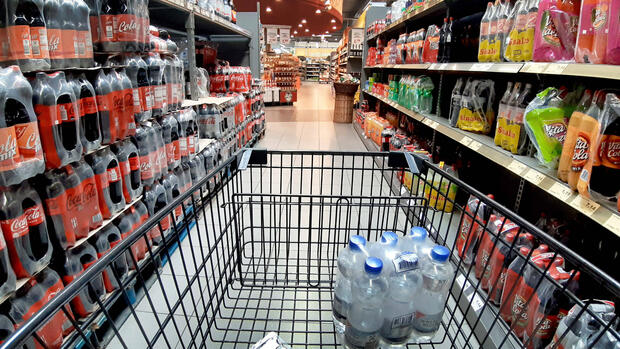Superfluous packaging should be avoided in the future.
(Photo: IMAGO/Martin Wagner)
Berlin Environment Minister Steffi Lemke (Greens) is aiming for a tightening of the packaging law. Large retailers are thus subject to new obligations when offering and taking back returnable bottles. A corresponding draft law has been going through the internal government departmental vote since this Tuesday.
The plans aim to “avoid superfluous packaging and promote ecologically advantageous reusable packaging”, according to a key issue paper by the ministry on the law. “We are thus implementing an important goal of the coalition agreement and are driving forward the consistent avoidance of waste.”
This is based on the realization that the consumption of packaging in Germany is at a high level. According to figures from the Federal Statistical Office (Destatis), the total amount of packaging waste, which is mainly collected separately from the residual waste in the yellow bin, glass or paper containers, amounted to 6.5 million tons in 2020.
With the tightening of the law, the so-called EU Single-Use Plastics Directive will be implemented at the same time. This obliges the member states to achieve a significant reduction in the consumption of certain single-use plastic products by 2026. Lemke said: “Packaging waste has been increasing in Germany for years, polluting the environment and annoying most consumers.” The new regulations are intended to help make everyday life easier for citizens.
What simplifications does the law bring for consumers?
In the beverage departments of supermarkets, refillable bottles are to be offered in addition to non-returnable bottles. After a transition period, supermarkets and discounters should each have to offer at least one reusable alternative for several types of beverages. According to reports, this should take effect from July 2025.
In addition, there should be a general take-back obligation for retailers. This means that consumers should be able to hand in their reusable bottles wherever drinks are sold. Here, too, a transitional period is planned until the end of June 2025.
>> Read also: Innovative winegrowers offer wine from the beer deposit bottle
The stricter regulations do not apply to every retailer, but only to shops with a sales area of more than 200 square meters.
What does the ministry expect from the tightened rules?
The ministry hopes for two things from the regulations. On the one hand, the consumer’s desire for “ecologically advantageous packaging” should be fulfilled, according to the key issues paper. At the same time, the ecological footprint of the beverage packaging sector should be reduced.
What will change with “to-go offers”?
Since January 2023, reusable alternatives must be offered for take-away food and drinks. So far, however, this has only applied to disposable food packaging made of plastic, not to packaging made of aluminum or cardboard, for example.
This obligation is now to be extended to all one-way packaging, regardless of the material. In the future, customers should therefore always have the right to receive their food and drinks in reusable packaging to take away. According to reports, implementation is planned by the beginning of 2025.
Are there exceptions?
Yes. Small suppliers that do not have more than 80 square meters of retail space and do not employ more than five people at the same time can also fill containers they have brought with them. This applies to kebab snack bars or sausage stands, for example.
What changes with on-site consumption?
From the beginning of 2025, there should no longer be any single-use packaging. Customers receive the burger to eat on site on a plate or in reusable packaging. This should also apply to all other foods and beverages. Small providers should be excluded.
There are exceptions here too: French fries or doner kebabs can still be offered in paper bags – regardless of the size of the company.
Will it become more expensive for consumers?
The reusable packaging must not be offered at higher prices, writes the Ministry of the Environment on its website. However, a deposit can be charged. This ensures that the packaging is returned to the store and can be used again. The customer gets the deposit back.
The federal government wants to take action against deceptive packaging. What do you mean with that?
Under deceptive packs is the reduction of the filling quantity with the same packaging. This should be inadmissible in the future – probably as early as July 1, 2024.
More: Lidl is opposed to the introduction of a reusable obligation for beverage bottles
